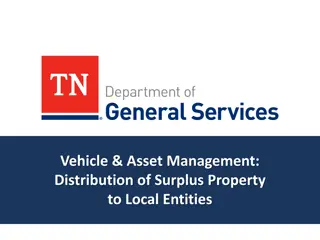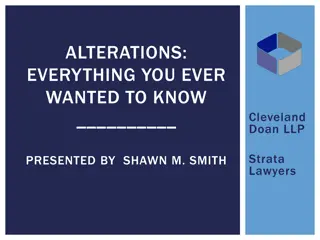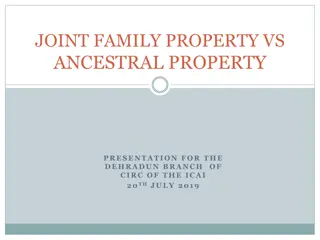
When Does Property Pass to Buyer in Sales Contracts?
Understanding the passage of property to the buyer in sales contracts, particularly for unascertained goods, is crucial in commercial transactions. Explore the rules and principles governing property transfer based on appropriation and contract terms.
Uploaded on | 0 Views
Download Presentation

Please find below an Image/Link to download the presentation.
The content on the website is provided AS IS for your information and personal use only. It may not be sold, licensed, or shared on other websites without obtaining consent from the author. If you encounter any issues during the download, it is possible that the publisher has removed the file from their server.
You are allowed to download the files provided on this website for personal or commercial use, subject to the condition that they are used lawfully. All files are the property of their respective owners.
The content on the website is provided AS IS for your information and personal use only. It may not be sold, licensed, or shared on other websites without obtaining consent from the author.
E N D
Presentation Transcript
THE TIME WHEN PROPERTY PASSES TO THE BUYER - 2 Mohd Imran
(ii) Unascertained goods The overriding provision in the case of wholly unascertained goods is s 16 of SOGA, which states the self-evident proposition that no property can pass until the goods are ascertained. In the nature of things, this is not a rule which can be excluded by contract. Goods become ascertained by unconditional appropriation. In the case of a contract for the sale of unascertained goods by description, the presumed intention of the parties as to the passing of the property is governed by r 5 of s 18, the first two sub-rules of which provide as follows:
(ii) Unascertained goods Rule 5 (1) Where there is a contract for the sale of unascertained or future goods by description, and goods of that description and in a deliverable state are unconditionally appropriated to the contract, either by the seller with the assent of the buyer or by the buyer with the assent of the seller, the property in the goods then passes to the buyer; and the assent may be express or implied, and may be given either before or after the appropriation is made. (2) Where, in pursuance of the contract, the seller delivers the goods to the buyer or to a carrier or other bailee or custodier (whether named by the buyer or not) for the purpose of transmission to the buyer, and does not reserve the right of disposal, he is to be taken to have unconditionally appropriated the goods to the contract.
(ii) Unascertained goods This is by far the most difficult rule to apply and is also one of the most important. A dispute as to the applicability of r 5 typically arises where the seller, having collected the whole or part of the price from the buyer in advance, becomes bankrupt without having made delivery. The buyer s rights are vitally affected by the question whether the goods have become unconditionally appropriated to the contract, for if they have, the buyer becomes the owner of them, whereas if they have not, he is restricted to proving in competition with other unsecured creditors. The following questions arise.
(ii) Unascertained goods: 1. To what classes of sale contract does Rule 5 apply? Opening words of r 5, which refer to contracts for the sale of unascertained or future goods by description. The rule does not distinguish wholly unascertained from quasi- specific goods - unascertained covers both categories. Future goods, even if specific, are brought within the rule. This may seem illogical, but in practice works well enough, because it is extremely unlikely that future goods will also be specific if they are sold by description, and r 5 is confined to sale by description.
(ii) Unascertained goods: 2. What other conditions must be satisfied? Given that the contract is of a class falling within r 5, four other conditions must be satisfied before r 5 comes into play. First, there must be an appropriation of goods to the contract. Secondly, the appropriation must be unconditional. Thirdly, the goods must be of the contract description. Fourthly, they must be in a deliverable state.
(ii) Unascertained goods: 2. What other conditions must be satisfied? In this context, the phrase deliverable state has a different significance from that which it possesses in relation to rr 1 and 2, for in r 5 it denotes the actual state of the goods as opposed to the state in which the seller has expressly undertaken to put them before tendering delivery. Hence for the purpose of r 5, goods are not in a deliverable state unless - (a) they are in fact in such condition that the buyer would not be entitled to reject them when tendered; or - (b) they are accepted by the buyer as being in a deliverable state.
(ii) Unascertained goods: 2. What other conditions must be satisfied? For the purpose of r 5 the distinction is less material than in other parts of the Act, for a defect in quality which prevents the goods from being in a deliverable state will render r 5 inapplicable even if the defect is not such as to prevent the goods from conforming to the description in the contract.
(ii) Unascertained goods: 2. What other conditions must be satisfied? This leaves the requirement of unconditional appropriation. What is meant here is some act which earmarks goods as the contract goods and irrevocably commits the parties to those goods, thus depriving the party who performs the act of appropriation of the right to change his mind and substitute other goods of the contract description. An act of constructive delivery which puts the goods out of the control of the seller as by delivery to a carrier without reserving a right of disposal or by procuring a third party in possession of the goods to attorn to the buyer almost always constitutes an unconditional appropriation.
(ii) Unascertained goods: 2. What other conditions must be satisfied? If there is no loss of control, assent to the specific act of appropriation is usually necessary. Such assent may be given before or after the act of appropriation and may be express or implied. The performance by the seller of what would ordinarily be regarded as acts of internal organization such as segregating the goods in his warehouse, packaging them and labelling them in the name of the buyer will not normally constitute appropriation unless the act in question was that specifically designated by the contract. Because the seller is entitled to say that what he does with the goods while they are in his control is entirely his own affair, and that having provisionally allocated goods to the contract, he has changed his mind and decided to allocate different goods.
(ii) Unascertained goods: 2. What other conditions must be satisfied? The position is different where the contract provides, expressly or impliedly, for an act of appropriation preceding the seller s loss of control, as where the seller agrees to sell the first widget I receive or the contract allows the seller to fix the contract goods by giving a notice of appropriation. See: Healy v Howlett & Sons
(ii) Unascertained goods: 2. What other conditions must be satisfied? See: Healy v Howlett & Sons The plaintiff contracted to sell to the defendants 20 boxes of mackerel. He dispatched 190 boxes of mackerel by rail from Valentia, Ireland, to Holyhead, consigned to his own order, giving instructions to the railway company at Holyhead to distribute the fish among his various customers, including the defendants. Due to the train being delayed, the mackerel arrived in Holyhead late and in such condition that it would inevitably be unmerchantable under its contract description when delivered to the defendants in London. The railway officials at Holyhead set aside twenty boxes of mackerel and dispatched them to the defendants, who rejected them as unmerchantable. After disposing of the mackerel elsewhere, the plaintiff sued for the balance of the price, contending that the fish had been appropriated to the contract at Valentia and that the risk of deterioration had thereupon passed to the defendants. Held, there was no appropriation until the twenty boxes had been set aside for the defendants at Holyhead, by which time the deterioration had occurred, so that the defendants were justified in rejecting the goods.
(ii) Unascertained goods: 2. What other conditions must be satisfied? It is worth observing that the requirement of assent to the seller s appropriation is just as essential in the case of goods which are being made by the seller for the buyer as it is for goods which the seller is to supply from stock or outside sources. If I instruct a boatbuilder to build me a boat of specified type and dimensions, and without further communication from me he proceeds with the work and completes a boat that accords with the specifications I have laid down, then surely, it will be said, neither he nor I can deny that it is my boat, in the sense of being the boat appropriated to my contract.
(ii) Unascertained goods: 2. What other conditions must be satisfied? But even here, the rule requiring assent applies: A tradesman often finishes goods, which he is making in pursuance of an order given by one person, and sells them to another. On the other hand, it would not be unduly difficult to establish an assent to the boatbuilder s appropriation of the boat (and indeed of the incomplete structure). It would suffice if I visited the boatbuilder s yard and made approving comments when he showed me the structure, or even if I telephoned to inquire about progress and the builder gave me details sufficient to identify the boat he was talking about and I did not dissent.
(ii) Unascertained goods: 2. What other conditions must be satisfied? It is important to bear in mind that while an unconditional appropriation is necessary if the property is to pass under r 5, it does not follow that it inevitably signifies an intention to transfer the property; nor is appropriation necessarily connected to actual delivery. Appropriation merely denotes the act by which the contract goods become ascertained and earmarked to the contract. There are many reasons why the parties may wish to reach the point of identifying the contract goods without necessarily intending that property shall pass at that stage.
(ii) Unascertained goods: 2. What other conditions must be satisfied? For example, a foreign buyer purchasing goods from an English seller on a c.i.f. basis will not ordinarily acquire the property until he has paid the price and taken possession of the shipping documents,155 but he will wish to know well in advance of that time on what ship the goods have been loaded so that he can either resell on a c.i.f. basis or calculate the time of arrival of the goods and organize arrangements for their collection. Again, if the goods are of a kind which is in short supply, the buyer may wish to be assured that goods have been earmarked from the seller s existing stock to meet the contract, even if the buyer does not require immediate delivery and is not to obtain ownership until payment at a later date.
(ii) Unascertained goods: 3. Can Rule 5 be excluded? In theory, since all the rules in s 18 are subject to a contrary intention, r 5 could be excluded by agreement of the parties. But such an exclusion would normally be pointless, since it would then be necessary for the parties to spell out their own rule to govern the passing of the property, and this could just as easily be done within r 5 itself, either by defining the act of appropriation or by reserving a right of disposal to the seller pursuant to s 19 or a right of substitution to the buyer in the contract of sale.
(iii) Quasi-specific goods Where the contract is for the sale of an unascertained part of an identified bulk, ss 16 and 17 and r 5 of s 18 of the Sale of Goods Act 1979 apply to the same extent as for wholly unascertained goods. But the identification of the source from which the contract goods are to be supplied produces one difference: - that the goods may become ascertained without any physical act of the seller or buyer, as the result of exhaustion, i.e., shrinkage of the bulk to a quantity no greater than that stipulated in the contract. This shrinkage may occur in various ways, e.g. delivery of part of the bulk to another buyer; reduction of the bulk through destruction or evaporation; or damage, deterioration or other change in composition of part of the bulk so that such part ceases to correspond to the contract description.
(iii) Quasi-specific goods Any of these events may produce the result that the contractual source of supply, being reduced to no more than the contract quantity, becomes referable in its entirety to the contract. The result appears to be that the seller is to be considered to have made an unconditional appropriation for which the buyer s prior assent suffices even though the seller has not lost control, since it is clear that the seller has lost the power to substitute other goods. If the seller has undertaken to notify the buyer when this stage has been reached, his failure to do so does not affect the ascertainment of the goods, though it may have consequences for the seller - if the buyer, being unaware that the goods are now identified and available for collection, does not collect them and they are later damaged or destroyed.
(iii) Quasi-specific goods Where separate quantities of goods on board a vessel or in a warehouse are agreed to be sold to the same buyer under different contracts, it is not necessary to allocate a particular part of the goods to a particular contract. It suffices that all the goods are intended for the buyer, either from the outset or by exhaustion following deliveries to other buyers.
(iv) Goods delivered on approval or on sale or return Rule 4 of s 18 of the Sale of Goods Act 1979 provides as follows: When goods are delivered to the buyer on approval or on sale or return or other similar terms the property in the goods passes to the buyer: (a) when he signifies his approval or acceptance to the seller or does any other act adopting the transaction; (b) if he does not signify his approval or acceptance to the seller but retains the goods without giving notice of rejection, then, if a time has been fixed for the return of the goods, on the expiration of that time, and, if no time has been fixed, on the expiration of a reasonable time.
(ii) Unascertained goods To be continued .


![Property Settlements in Family Law: Case Study of Stamatou & Stamatou [2022] FedCFamC1F 241](/thumb/63303/property-settlements-in-family-law-case-study-of-stamatou-stamatou-2022-fedcfamc1f-241.jpg)



















